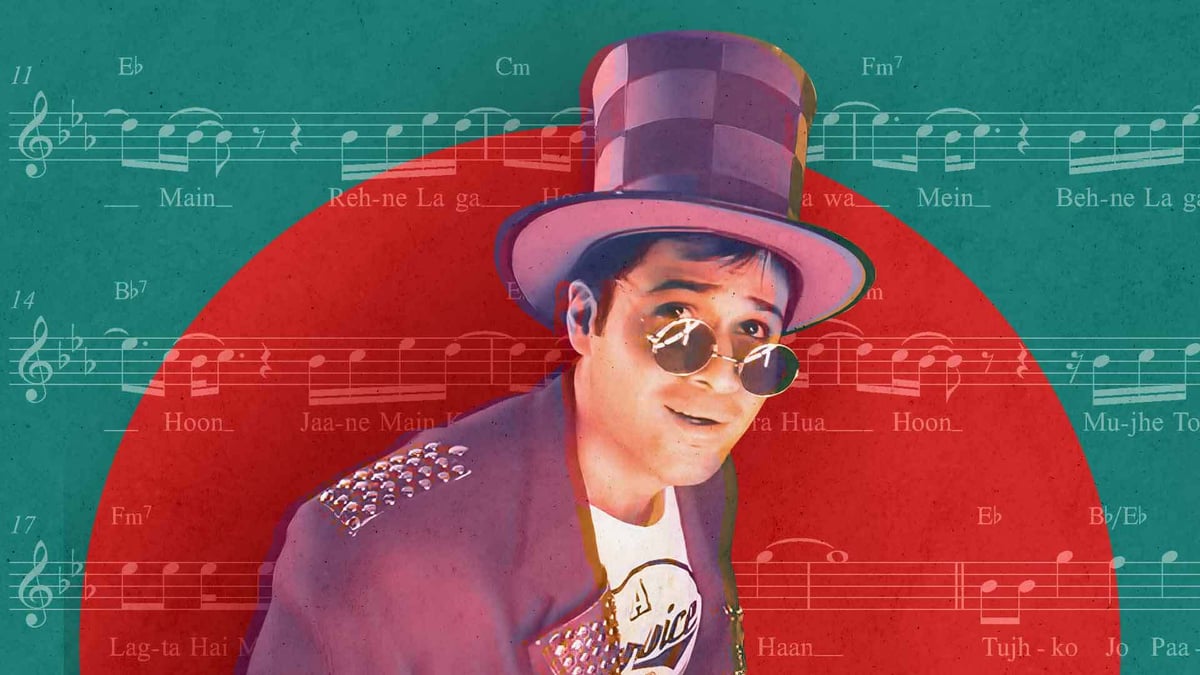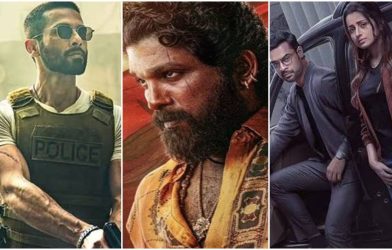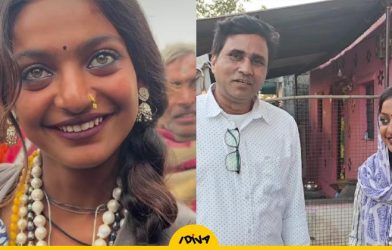
In Karan Johar’s Rocky Aur Rani Kii Prem Kahaani (2023), after Kanwal (Dharmendra) and Jamini (Shabana Azmi) share a kiss in front of their whole family, Rocky’s friend remarks, “Your grandpa turned out to be the Emraan Hashmi of old people.” It’s a reference to Emraan Hashmi’s reputation as the “Kissing King” of Bollywood, thanks to the actor generously embracing the erotic in the first part of his career. Hashmi seems to be intent upon expanding his repertoire, having made his theatrical comeback as the villain in Tiger 3 (2023) and entering the OTT space with roles in Showtime and Ae Watan Mere Watan this year. Fans will tell you the actor remains underrated and underutilised, despite a promising start to his career with breakthrough performances in films like Murder (2004) and Jannat (2008). But whatever the limitations of his filmography may be, Hashmi has given us some of modern Hindi cinema’s most memorable songs of love and heartbreak.
In a way, Hashmi’s early films — which featured mellow, lyrical love songs laced with sensuality — framed a distinctive sound and era of music in Hindi cinema, making “Emraan Hashmi Songs” a genre unto themselves. His passionate performances, frequently paired with KK’s golden vocals, have a special place in our hearts.
“Bheegey Hont” from Murder (2004)
Full of twists and turns, Murder sees Emraan Hashmi as an ostensible womaniser with more than a few secrets up his sleeve. “Bheegey Hont” (composed by Anu Malik and performed by Kunal Ganjawala) is incredibly sultry, and features Hashmi and his co-star Mallika Sherawat entwined together in a variety of amorous positions, one of them on a giant water tank on the roof of a building. Later in the song, the two sleep naked on a concrete ledge extending out towards the main road, busy traffic underneath them. You ask “Why?”, we say “Why not?” The song was Ganjawala’s first big Bollywood hit.
“Woh Lamhein Woh Baatein” from Zeher (2005)
Atif Aslam lends his rich timbre to this despondent song about a man’s fraying relationship with his wife and his attraction towards another woman. Rain is a motif in both the lyrics and the music video, with the protagonist repeatedly singing about the “barsaaetein” and the secret memories it holds for him. Hashmi alternates between being a passionate lover and a cold husband, frolicking with his girlfriend on the beach and getting into fights with his wife. Meanwhile, Aslam sorrowfully croons in the background. The film’s soundtrack (composed by Anu Malik, Roop Kumar Rathod, Mithoon, Jal: the Band) also features “Agar Tum Mil Jao”, one of Shreya Ghoshal’s most beloved songs.
“Tu Hi Meri Shab Hai” from Gangster: A Love Story (2006)
The Pritam-KK-Emraan Hashmi combination is one that simply does not miss. Hashmi’s character in Gangster is a singer at an Indian restaurant in Seoul. He dedicates this song to his lover, confessing that she is his day, his night and his whole world. She is time itself and he is but a moment. KK’s staggered articulation of the phrase “tu waqt” is inspired, and the soulful ‘oh’s in the post-chorus deserve a shrine built in their honour. Sensitive and brandishing a guitar, Hashmi is the consummate lovelorn artist. He is also shown to be a caring friend to Simran (Kangana Ranaut) in the nascent stages of their relationship. The song has extended instrumental interludes between the verses, which is embellished by the flute. The ad-libs at the end feel euphoric, particularly as they correspond with a display of fireworks in the music video. The award-winning soundtrack of this film also features the magnificent “Ya Ali” by Zubeen Garg.
“Teri Yaadon Mein” from The Killer (2006)
In this action-thriller, Hashmi is a lovestruck taxi-driver who locks horns with a sinister serial killer (played by Irrfan Khan). During “Teri Yaadon Mein” (composed by Sajid-Wajid and performed by KK and Shreya Ghoshal), Hashmi is peak brooding sadboi. Deeply conflicted, he reminisces about the woman he loves, accompanied by a glorious electric guitar riff. The internet has playfully wondered why this rock song about pining and “tanhaiyaan” is being performed by an older man who looks like he would rather be singing bhajans at a satsang. We soon see Hashmi himself emotionally lip-syncing the lyrics in vast deserts and rocky beaches, reunited with his lover, but only in his imagination. The highlight of the song is KK’s powerful high note at the end of each chorus, filled with frustrated longing.
“Zara Sa” from Jannat (2008)
The Pritam-KK-Emraan Hashmi combination strikes again with this immensely popular track from Jannat. In the music video, Hashmi mouths the lyrics of the song while driving and attempting to impress a group of women. Contrary to its title, however, “Zara Sa” is a big, grand declaration of love, especially with the lyrics: “Main chahun tujhko, meri jaan, bepanah // Fida hoon tujhpe, meri jaan, bepanah” (My desire for you, love, knows no limits // I’m gone on you, love, beyond all limits). From its beautiful opening instrumentation to that iconic chorus, and of course, KK’s classic series of ‘oh’s, this song is etched into the minds of an entire generation.
“Dil Ibaadat” from Tum Mile (2009)
Emraan Hashmi is a struggling artist in this love story set against the backdrop of the 2005 Mumbai floods. The melancholic opening notes of “Dil Ibaadat” (composed by Pritam and performed by KK) tug at the heartstrings and the lyrics speak of a devoted heart’s plea to be understood. KK imbues a great deal of feeling into the lines: “Jo bhi saansein main bharun, unhe tere sang bharun // Chahe jo ho raasta, use tere sang chalun (Every breath I take, I want to breathe with you // No matter my path, I want to walk with you).”
“Pee Loon” from Once Upon a Time in Mumbaai (2010)
Composed by Pritam and performed by Mohit Chauhan, “Pee Loon” is about how thirsty the protagonist is, literally and metaphorically. Cocky and moustachioed in his role as a gangster, Hashmi romances Prachi Desai in the graffitied alleyways of old Bombay, smirking at her in cafés and dancing with her on terraces. Chauhan’s vocals bring a note of playfulness and yearning to the song. The chorus is an ode to a love that elicits both eager restlessness and a sense of peace, a love whose absence feels unbearable.
“Mere Bina” from Crook (2010)
Although this film received mixed reviews, it was the song “Mere Bina” (composed by Pritam and performed by Nikhil D’Souza) that won hearts and topped charts. In the music video, Hashmi takes his date to a drive-in theatre and dramatically proclaims he may just be her heart’s deepest desire (while standing on the hood of the car). The lyrics carry the hope and excitement of a love that makes life worth living, and the desire to forever freeze this perfect moment in time. Try not to sing along to the main hook “Tujhko jo paya” (Now that I’ve found you): Challenge failed.
“Hale Dil” from Murder 2 (2011)
Composed and performed by the then upcoming artist Harshit Saxena, “Hale Dil” sees Hashmi sporting a regrettable mullet while staring lustily at the heroine (Jacqeline Fernandes). The lyrics are as romantic as the music video is racy, speaking of how much his heart aches for his lover, and how he would ask time itself to return every moment he spent with her. When the song builds up to that heater of a chorus, be prepared to start head-banging. Harshit Saxena may have been a one-hit-wonder, but what a hit it was.
“Tu Hi Mera” from Jannat 2 (2012)
In this popular song composed by Pritam, Shafqat Amanat Ali’s soulful vocals give voice to the feelings of Hashmi’s character, an arms-dealer who wishes to settle down after falling in love. When the beat finally comes in during the chorus, it feels like falling in love for the first time. The repeated “Tu hi mera (You are mine)” makes for a catchy refrain. In the music video, Hashmi and debutante Esha Gupta gambol amidst the marketplaces, parks and ancient monuments of Delhi. Nearly a decade after his debut, Hashmi has lost none of his charm, effortlessly portraying starry-eyed love and burning desire in the way only he can.









